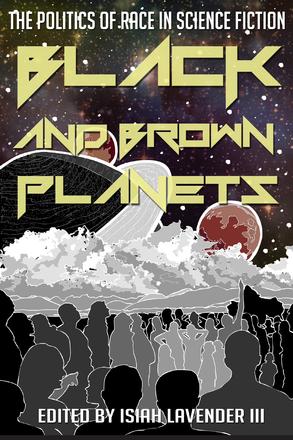
Black and Brown Planets
The Politics of Race in Science Fiction
Literary explorations into the radical, hopeful racial futures imagined by science fiction
Description
Black and Brown Planets embarks on a timely exploration of the American obsession with color in its look at the sometimes-contrary intersections of politics and race in science fiction. The contributors, including De Witt D. Kilgore, Edward James, Lisa Yaszek, and Marleen S. Barr, among others, explore science fiction worlds of possibility (literature, television, and film), lifting blacks, Latin Americans, and indigenous peoples out from the background of this historically white genre.
This collection considers the role of race and ethnicity in our visions of the future. The first section emphasizes the political elements of black identity portrayed in science fiction from black America to the vast reaches of interstellar space framed by racial history. In the next section, analysis of indigenous science fiction addresses the effects of colonization, helps discard the emotional and psychological baggage carried from its impact, and recovers ancestral traditions in order to adapt in a post-Native-apocalyptic world. Likewise, this section explores the affinity between science fiction and subjectivity in Latin American cultures from the role of science and industrialization to the effects of being in and moving between two cultures. By infusing more color in this otherwise monochrome genre, Black and Brown Planets imagines alternate racial galaxies with viable political futures in which people of color determine human destiny.
Reviews
"Since Mary Shelley and Edgar Allan Poe, science fiction has been troubled by color, with hopeful monsters and terrifying insurgencies intermittently rupturing the genre's pallid certainties. Drawing together African American SF and indigenous futurism, Black and Brown Planets suggests that now at last their time is here. "
- Mark Bould, reader in film and literature at The University of the West of England and co-editor of Science Fiction Film and Television
"Isiah Lavender has assembled some of the field's top scholars and most important emerging voices in an essential volume that shows the range and depth of science fiction's engagement with questions of race and racism. This groundbreaking collection combines work on well-known writers of colour such as Samuel R. Delany and Octavia Butler with analysis of work by indigenous and Latino writers such as Leslie Marmon Silko and Ernest Hogan. Reading this collection leaves no doubt that racial difference structures the science fictional imagination, and Lavender's volume demonstrates both the dangers of complicity with imperialist ideology to which SF can succumb and the power of its tools in the hands of writers of colour to resist and revise racist stereotypes and articulate a more promising future. Black and Brown Planets promises to be an indispensable reference for understanding the critical ethnic imaginaries of twenty-first century science fiction. "
- Sherryl Vint, professor of science fiction media studies, co-director of the Science Fiction and Technoculture Studies Program, University of California, Riverside
"From Isiah Lavender's powerful introduction in which he recounts his first memories of racial otherness and of being the target of racism to Robin Anne Reid's pioneering coda in which she brings to SF fan studies the analytical tools of computational linguistics in the service of constructing a social ontology of race, with a dozen fine essays in between, Black and Brown Planets significantly expands and intensifies our understanding of the ways in which 'the literature of the future' has sometimes earnestly grappled with, sometimes simply erased, and sometimes blithely ignored issues of race. The essays in this collection extend the color line studied in Lavender's Race in American Science Fiction to global color lines, including those involving indigenous peoples in America, Brazil, Mexico, and Thailand, always with an eye toward ways in which race and ethnicity figure in the construction of SF societies. "
- Brooks Landon, Herman J. and Eileen S. Schmidt Professor at the University of Iowa